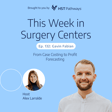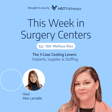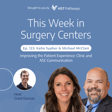Introduction to 'This Week in Surgery Centers'
00:00:01
Speaker
Welcome to This Week in Surgery Centers. If you're in the ASC industry, then you're in the right place. Every week, we'll start the episode off by sharing an interesting conversation we had with our featured guests, and then we'll close the episode by recapping the latest news impacting surgery centers. We're excited to share with you what we have, so let's get started and see what the industry's been up to.
AI in Surgery Centers: Reducing Payer Denials
00:00:28
Speaker
everyone, here's what you can expect on today's episode. Marcia Diamond is the Director of Coding Solutions at ADO Technologies, and I had the opportunity to talk with her about how AI can be used to reduce payer denials.
00:00:43
Speaker
Now, I know there is a lot of AI talk going on and it can feel overwhelming trying to understand what it is and how it can actually be woven into our lives. But Marsha did a great job breaking it down for us. We covered how AI can be used to avoid the most common causes for denials, which of course would ultimately help you increase speed to revenue. We also chatted about the accuracy of AI, challenges you may face, and any ethical considerations.
00:01:13
Speaker
In our news recap, we'll cover Nimble's new CEO, Kelly Blair, the cybersecurity threats that medical devices may impose, how ASCs can benefit from physician burnout at hospitals, and of course, end the new segment with a positive story about six sisters going through nursing school together. Hope everyone enjoys the episode and here's what's going on this week in Surgery Centers.
Marcia Diamond's Journey in Healthcare Coding
00:01:43
Speaker
Hi, Marsha, welcome to the podcast. Thank you so much for having me today. Can you share a little bit about yourself and your healthcare experience? Sure. I've been in the healthcare field for about 30 years. Most of my years have been doing coding and auditing in the healthcare arena. In the last couple of years, I've joined the Adeo team and I'm the director of coding and compliance for the team.
00:02:08
Speaker
My job at Adeo is to assist with making sure that all the coding is consistent and it's within the third-party guidelines and that we're staying within, you know, how the commercial carriers want the information submitted to them. So I'm using my auditing and coding experience from my previous years in helping the AI learn how to code.
00:02:28
Speaker
Yeah, that's great. And I'm really excited to have you on today because as you know, AI is being talked about so much right now, but it could be really hard to narrow down exactly how you can use it, especially in a surgery center setting.
AI Assisting Coders with Complex Tasks
00:02:42
Speaker
So let's just jump right into it. How can AI be woven into coding?
00:02:49
Speaker
Well, a lot of people think that AI just takes over the whole process. And the one thing that I think is really important for your listeners to know is that's not the purpose of AI. Its purpose is not to take over coding, it's to augment or aid the efforts of the coder. So one of the things that the problem with coding is that coders are expected to code, they're expected to audit, they're expected to do denials, they're expected to do just a multitude of functions.
00:03:15
Speaker
half of which they never get to. So this allows them that ability to take some of the more mundane tasks, some of the coding that's very easy, that's really easy, let's say for the AI to learn and turn that over to the AI so that they have the opportunity, it's like an extra brain for them and the ability for the AI to take some of those duties, take care of them for them so that they can take care of other duties that perhaps either the AI can't do or that require the expertise of an actual human coder.
00:03:45
Speaker
So it's really an augmentation and it's not really something that they're going to code. Now, what am I going to do? It's really an augmentation of that. Sure. That makes sense. And when AI has been woven into the process, have you seen denial rates improve?
00:04:03
Speaker
Absolutely. One of the nice things is that really was an unexpected benefit for a lot of our clients. So I will say that a lot of time when we use AI for medical coding, we use it because of productivity and the fact that the AI can code a lot faster than a human can code. We also use it because the AI can be a lot more consistent and accurate in what it codes, but a lot of folks didn't sign up for AI because, oh, that's going to help my denial rate.
00:04:31
Speaker
But what happens is that because the AI is being more consistent and it knows what prompts the denial that the information is more accurate, so it means that there's less denials that have to be worked.
00:04:44
Speaker
And it also means that because some of those duties are being taken over by the AI, the coder now has the time to work those denials. So it's a twofold process of the benefits of it, even though that really, again, isn't the reason that most people, you know, start out saying I want to have, you know, AI code my work.
00:05:02
Speaker
Some of our clients, I would say the average is probably 20 to 30% improvement as far as the denials, but some even more. And again, it's all because of that twofold process of more time to work what there is and less of them to work as a result of the consistency of the AI.
00:05:20
Speaker
Yeah, that's an incredible success that they're seeing when AI is to your point, part of the process, not taking over the process. And in what you've seen, how accurate has the tool or just AI in general been compared to traditional methods?
00:05:37
Speaker
Every AI company is going to be a little bit different, but most AI companies are going to have a threshold. Our threshold happens to be 95%. And the reason it's 95% or greater is that's what Medicare uses. So when Medicare comes in and does an audit, they expect you to be at 95% or better with the understanding that they understand that mistakes are going to get made, nobody's perfect, et cetera.
00:06:00
Speaker
So they allow a 95% accuracy rate. So we set our rate at 95% or above for that same reason. So it coincides with the Medicare rate. Our clients have the ability to set that rate so they can make it higher, they can make it lower, whatever they want to make it. But basically if it's set at 95%, it basically means that when the AI code something, if it goes through its calculation and figures out that it's not 95% sure that code is correct,
00:06:30
Speaker
then it goes into what's called a prediction queue, and it's sent back to a human coder to look at and say, yeah, it's right, or no, it's not right. And then once the human coder does that and feeds that information back into the AI learns that, and then next time that comes around, then it's able to code that, or it may take a few passes before it's ready to do that. But so we basically say 95% or greater is really the accuracy rate that we're looking at.
Monitoring and Auditing AI for Accuracy and Reliability
00:07:00
Speaker
Yeah, that's incredible. And you've also answered my next question, which is what measures do you have in place to ensure, you know, all of this is reliable and going smoothly. But that's interesting that you have that human element built right into the process.
00:07:14
Speaker
Correct. So that's part of it. And that's why I think it's so important for your listeners to understand that this is a team process. This is not a somebody's taking over and somebody's not having work, et cetera. So it's monitored on a daily basis. So the AI is monitored on a daily basis. We do regular runs of charts to make sure that 95% is still being maintained, even though the AI is maintaining it.
00:07:41
Speaker
to check to make sure that really truly is in fact happening. We have ongoing auditing actually going on. So the AI actually has the ability to audit itself as well as the humans auditing it. And if our client says, I don't trust any of you, I want to check it for myself, it has the ability to have an audit function that they can actually take so many charts in a given day, a certain percent, a certain number of charts,
00:08:07
Speaker
throw those into a queue and they can actually audit those themselves, whether they're AI coded charts, human coded charts to see that, yes, you are in fact meeting that threshold. Yes, you know, there aren't any mistakes that you're not aware of, et cetera. So it's really an ongoing process. It happens regularly in the organization through both, both the AI side as well as the human side.
00:08:29
Speaker
Sure. And it's interesting too, with all the new technology coming out, the fact that it's coming out simultaneously with all the staffing issues that the industry is
AI's Impact on Coder Roles and Career Growth
00:08:40
Speaker
experiencing. I read somewhere that coders have also taken a hit in terms of just like staffing and pipeline and how many are predicted to be in the industry over the coming years. So I think like these tools are just such a great way to partner.
00:08:54
Speaker
Yeah, and I think it's really important for the coders to understand that, first of all, AI is never going to replace coders. There are some, I mean the AI is only learning from what we teach it. Okay, so we still have to have those coders that know how to code it to tell the AI, you know, this is how you code this particular scenario so
00:09:13
Speaker
they're always going to have to work together hand in hand with the AI. It brings on new opportunities for coders because, like myself, I mean, I've been in the coding field for 30 years coding and auditing. So, I mean, this is the first time in my lifetime that I've taken on a new role. And it's very exciting to be involved in training the AI and seeing how you're able to tell it what it needs to do and have it do it.
00:09:37
Speaker
So bring some new opportunities and new career opportunities. And especially since coders are getting more, if you will, IT savvy or health information savvy, et cetera, this is just another aspect of that HIM IT type world of having folks that are coders and auditors and are really working the AI side of things. So I look at it like, yeah, if you might lose a couple of jobs on this side, but you gain a couple of jobs on the other side,
00:10:05
Speaker
And again, I don't ever really see AI taking that over. Yeah, I agree. It's just a wonderful compliment. Yeah. So what challenges have you seen healthcare providers facing when they're trying to integrate AI into their existing processes and systems?
Challenges of AI Integration in Healthcare
00:10:23
Speaker
Well, the two biggest challenges are IT integration.
00:10:27
Speaker
and probably the second one would be coder acceptance. As far as IT integration, I think the hardest problem with IT integration is having someone at the facility or the potential client that is able to work with our IT folks and able to get the files to pass back and forth. And I'm not an IT person, so I don't know all the technical jargon that goes with that, but
00:10:51
Speaker
It's sometimes very difficult if you have a small organization or a client that's not of a substantial size and they don't have a full blown IT department. A lot of times they're not necessarily aware of what's involved in getting those files to us. We have a full blown, of course, IT department since we have AI and we'll assist them and help them. But sometimes it's a bit of a challenge if the other end's not real computer savvy. So that's probably one challenge.
00:11:19
Speaker
The other challenge is coder acceptance and the fact that, again, I think many coders and many people, not just in the healthcare field, but in the world, think that the AI is going to take over their jobs and AI is some creature from outer space that's going to read our minds. And that's just not really what this is all about. And I think if people understand that,
00:11:42
Speaker
and realize that it learns the same way we do when we went to school and we learned something we learned it from repetitive information. I mean I'm sure everyone can still remember the days that they were in school when you know that teacher drilled and drilled something into you and you were like oh my gosh and as many years old as I am I still remember some of those which means obviously I learned it
00:12:03
Speaker
It's never going to go away. So the AI basically does the same thing. It's just looking at a record and it's reading that record and saying, oh, I see a phrase there. And that phrase says chess, PA and lateral. And every time I see that word or that string or phrase of words, I see this code CPT code 7 1 0 4 6. Oh, that must mean when I see these words, this code should be applied, which is exactly the same way we learn.
00:12:28
Speaker
So the advantage to AI is that it can go through so many more records in an hour or a day than what we can. So for us to do it, it takes us years to be able to learn to do that. For it, it doesn't take that long because of the volume of charts that it can go through. So it can do 50,000 encounters an hour.
00:12:48
Speaker
the average coder can do somewhere around 20 charts an hour. So in no time, it can learn because it can go through 50 of those chest x-rays and do enough of them to be confident, 95% confident that, okay, so when I see that, it's this code. And so that's why it can learn more quickly than an actual human can learn. So I think getting the coders to accept it and understand that it learns just the same way that they do is really important.
00:13:18
Speaker
And again, there are always going to be those nuances that the AI can't code. So for those that are in your audience that are coders, they understand that coding is not always black and white. And there's always these little nuances and these little situations of, well, in this case, I can code both codes, but in this code, I can't code both codes. And sometimes those types of scenarios are going to be difficult to teach the AI. It doesn't really have a thought process. It's again, learning by training, by repetitive work.
00:13:47
Speaker
So those are always going to be something that the coder is going to be working on and that the AI probably will never be able to actually master, at least probably in our lifetimes. So I just think coder acceptance is really important. We've had a couple clients that.
00:14:03
Speaker
The company was all gung-ho for AI and ready to go. And the coders were putting the skid on things and going, yeah, no, that's not something we really want to do. And we actually came in and did a empower your coders with AI and making them understand that unique relationship between the coder and the AI and how they work as a team so that they understood what was involved and that it's not an infringement on their job or anything like that. So I think that's really important.
00:14:32
Speaker
Yeah. And I think there's certain people to just have different mindsets with change and it can be really difficult to overcome sometimes, but I think with, you know, the success people are seeing when they are implementing AI can hopefully get some of those people who have concerns over the hump and ready to, to learn something new.
Ensuring Compliance in AI Systems
00:14:51
Speaker
Yep. Absolutely. Now, are there any ethical considerations you're worried about with this or no? No, I'm, I don't really have any ethical concerns, but I do.
00:15:01
Speaker
We do caution our clients. So all of the healthcare organizations should have a compliance program already in place. And that doesn't mean that because now you have AI in place that you just turn it loose and take off and you just don't worry about it anymore. You should still have a compliance plan. That compliance plan should include, you know, regular auditing and keeping records of what you've audited to make sure that you can prove to
00:15:26
Speaker
another entity like Medicare or CMS or whoever might come in an attitude that even though AI is doing it, that it is being monitored and that it is in compliance with their third-party guidelines that they have in place. So I just do caution clients that don't get rid of your compliance plan, don't get rid of your compliance department or committee, whatever you have.
00:15:48
Speaker
you still want to make sure that you're keeping to those guidelines. And that's one of the things that I do for our organization is always making sure that no matter what the AI does, because again, it's looking at codes and strings of words and it doesn't really have a compliance plan. It doesn't understand that, you know, that code equals this, but maybe that's not appropriate in this situation.
00:16:10
Speaker
So I think it's important to continue the same compliance that you had in place and continue auditing and keeping those compliance studies that you've done so that you can show those to the third party carriers if they do come into audit.
00:16:24
Speaker
Yep. That's a great call out. It reminds me, it's like old story from like 10 years ago, but there was a guy who had just realized his RV had cruise control and he put his RV on cruise control and went in the back to make a cup of coffee. And as you can imagine very quickly, the RV crashed.
00:16:43
Speaker
And he couldn't understand why, but whatever I hear these stories, I'm like, okay, yes, we have these, these amazing tools to help, but we still have. Yeah. Kind of sounds, it sounds like the electric car stories I hear of. Yes. You know? Yeah. Yes. They are supposed to be hands-free in some circumstances, but they're not programmed to go on a dirt or gravel road. That's not on the roadmap that it doesn't know where it's supposed to drive, et cetera. So.
00:17:07
Speaker
And it still goes back to the same thing, is that AI is as good as what you've taught it. That car is as good as what you've taught it. That RV is as good as what you've taught it. And in the case of the RV and the electric car, nobody taught it, so it didn't know what to do. So the AI is the same way. If you don't teach it what it needs to do in certain scenarios, then
00:17:26
Speaker
those particular encounters is going to have to throw to a human. And then the human should be able to say, oh, okay, I haven't trained it on that. So let me go back and train the AI and tell it what to do with that. And then it will be able to code that. And so it'll just continue to learn and continue to learn more things and give the coder more and more time to work on other things that they need to work on, so.
00:17:48
Speaker
Yep. Well said. All right, Marsha, we do this every week with our guests. What is one thing our listeners can do this week to improve their surgery centers?
00:17:59
Speaker
I would say that the main thing that they can do is if they're going to use AI, let the AI do what it does best and let the coders do what they do best. And by that, I mean the AI may be better at some of the more routine tasks. So again, taking my example before of that chest x-ray that is for a coder, a relatively simple task, and they can do a ton of those an hour, probably with their eyes closed.
00:18:25
Speaker
But those are the kinds of tasks that AI does best. So prioritize things and use your staffing. And I think of AI as staffing. Use your staff wisely and use the AI where it can best be used and give you the most productivity, the most consistency, the best turnaround, and use your coders where they can best be used on things like working those denials, making sure that you're compliant, and providing the audits that you need, et cetera.
00:18:54
Speaker
So it's all about using your resources wisely and making sure that you're using your coders wisely and your AI wisely in your organization on a daily basis. Perfect. That is great advice. Thank you so much for coming on today. We really appreciate it. Okay. Thank you so much for having me. I appreciate it. As always, it has been a busy week in healthcare, so let's jump right in.
Leadership Changes at Nimble
00:19:21
Speaker
Nimble, formerly National Medical Billing Services, is a company that many of you are familiar with, and they have had a significant change in their leadership structure this past week. Kelly Blair has stepped into the role of CEO and will also be joining the board, as Nader Sami, who was the CEO for an impressive 14 years, will be transitioning to the role of Executive Chairman of the board.
00:19:47
Speaker
Now let's talk about Kelly Blair for a moment. She's joining Nimble from Therapy Brands, where she served as the chief operating officer. And before Therapy Brands, Kelly was the senior vice president and general manager of the health system services business at Change Healthcare.
00:20:04
Speaker
where she was a key player. Under her leadership, they saw significant growth, particularly with some of the largest health systems in the country. Also in the announcement, Nader reflected on his time as CEO with a touch of nostalgia and pride, as you can imagine. He talked about building Nimble over the past 14 years, calling it the professional honor of his lifetime. And Nader described Kelly as the perfect leader to take Nimble and their clients to new heights,
00:20:33
Speaker
praising her impressive track record. So a huge congrats to Nader for an incredible run as CEO and congrats to Kelly on her new role.
Cybersecurity in Medical Devices
00:20:44
Speaker
For our next story, let's talk about cybersecurity. The latest concern is the specific vulnerabilities that medical devices pose to healthcare facilities.
00:20:54
Speaker
Medical devices such as MRIs, ventilators, and pacemakers are increasingly becoming targets for hackers because they hold valuable patient data and have the potential to cause such a disruption with patient care. Toby Gawker from First Health Advisory calls medical devices the Achilles heel for health systems. His concerns stem from the fact that most of the equipment contain aging tech and outdated software and do not receive patches or upgrades.
00:21:25
Speaker
But interestingly enough, as of last March, new laws will require manufacturers to submit plans for addressing cybersecurity vulnerabilities and new medical devices. And they are also being incentivized to protect their brands and work to boost security.
00:21:40
Speaker
So this is just your reminder that as technology advances, so do the threats. And it's crucial for both manufacturers and healthcare providers to stay proactive in protecting medical devices, which means you're ultimately protecting your patients and their data.
00:21:57
Speaker
I would recommend having a conversation with each of your medical device suppliers to gain an understanding of how they are protecting you and what their plan is if there is a successful attack so you know exactly what to do and don't end up scrambling.
00:22:12
Speaker
All right, in our third story, we're going to start with a bit of doom and gloom, but then it will take a positive turn, I promise.
Physician Burnout and ASCs as a Solution
00:22:20
Speaker
According to Physician Thrive's 2023 compensation report, we're looking at a potential shortage of around 124,000 physicians by 2034.
00:22:32
Speaker
Now, as you all know, this number reflects a much deeper issue. Physicians across all specialties are experiencing burnout, career dissatisfaction, and unhappiness. And it's not just the newbies. Season doctors are feeling it too. According to a report from Medscape, a whopping 74% of physicians who are planning to retire are citing burnout as the reason. But here's where it can get interesting for ASCs.
00:23:01
Speaker
Amidst this gloomy scenario, ASCs might just have the upper hand over larger hospitals and health systems, especially the independent ones. So the independent ASCs typically have smaller staff and are not part of a massive health system, meaning they can make and implement policies, staffing, or practice changes.
00:23:21
Speaker
with far less bureaucracy than their larger counterparts, which could significantly improve a physician satisfaction level with their career and just make them feel more in control. And healthcare leaders like Dr. Catherine Chang, who is the VP and Chief Quality Officer for Prisma Health, are optimistic about what ASCs can bring to the table. Dr. Chang believes that ASCs can solve the physician burnout and dissatisfaction problem and help to curve some of those retirement numbers.
00:23:51
Speaker
So if your ASC is currently looking for more physicians, you can certainly tap into the sentiment in your recruiting and marketing efforts to show them that the grass is really greener on the other side.
Inspiring Story of Six Sisters in Nursing
00:24:04
Speaker
And to end our new segment on a positive note, the six Lawrence sisters, Alexandria, Danielle, Dominique, Gabriella, Lauren, and Natalia are all pursuing a career in nursing together.
00:24:18
Speaker
After a decade of homelessness, the sisters did whatever they needed to in order to get an education and never gave up on their dreams of becoming nurses together. They earned their GEDs in 2019 and received degrees in public health just this past May. Each sibling, now aged 19 to 25, admits they are just getting started and are currently working on their master's degree in public health. And then they intend to head to nursing school.
00:24:48
Speaker
The sisters say it is their unbreakable bond that has sustained them through immense challenges. And this is such a great story and I'm so excited to see their continued success together. And that news story officially wraps up this week's podcast. Thank you as always for spending a few minutes of your week with us. Make sure to subscribe or leave a review on whichever platform you're listening from. I hope you have a great day and we will see you again next week.




















